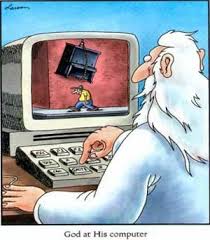
Doubt, and the Fear of Death
Back in 1995 when I was 53 years old, I wrote a Father’s Day piece for The Des Moines Sunday Register about Pat Carney, my 94-year-old father. It was entitled, “Dad, at 94, Is in Transition.” He died the same year.
“It was only a couple of years ago,” I wrote, “two decades after his retirement and 10 years after my mother’s death, that he began showing signs of senility. His doctor said he was in the early stages of late-onset Alzheimer’s disease.
“His losses are formidable. His spouse, all but one of his four brothers and sisters and nearly all of his friends are deceased. He still asks for them, believing he will soon visit them – or his own parents or grandparents – ‘on the farm.’ He doesn’t know where he is, the year, month or day of the week. He only occasionally recognizes his children or remembers that he has children. His sight is bad, hearing poor and he has a permanent catheter to empty his bladder. Formally fastidious about his appearance, his clothes routinely wear evidence of his latest meal.
Corridors of his Mind
“He spends most of his days in the narrow corridors of his mind, apparently dreaming about the past, often believing he’s still in it.
“Judging by the standards of healthy young people, his life is not worth living. But as miserable as it appears, from another perspective his decline is as natural a process as its opposite, the remarkable development of an infant. He loses one motor or cognitive function after another, antonymous to the way infants gain them. Nobody laments that an infant can’t speak, eat without help, slobbers and wears diapers. An infant is in transition, it’s said. So is my Dad.
“…Our family’s belief that a better life awaits him makes it easier to understand and accept what’s happening to him. And it makes me less fearful of ending my days in a similar way.”
Now firmly entrenched in old age, am I still less fearful of ending my days in that, or any, way?
Still Less Fearful?
Yes, I am still less fearful. I have little fear of death, but I fear the pain and suffering that seems inevitable for the elderly. And similar to my parents, and many generations of our family, my faith has a lot to do with it. I believe in a loving, merciful Father who doesn’t allow his children to dissolve into oblivion, and trust that God will help me confront whatever awaits.
I think about death almost every day, but I consider that normal for someone my age. I don’t fixate on it, however. I leave the details, such as the where and when, to God and try to live life as fully as my circumstances allow. Both my spouse and I are blessed with good health, but I realize that could change at any time. My motto, which I believe is God-inspired, is, “Live until you die.”
Part of Faith
As for doubt – departing from the stress I felt about it in the past – I also leave that to God. I consider doubt part of faith and my search for God. And as I’ve mentioned before in these blogs, my doubt is probably no deeper than the doubt of many agnostics and atheists about their views of reality.
One of the prayers I’ve made my own is that of the father of a sick boy in the Gospel of Mark. The father asks Jesus for a cure. Before granting his request, Jesus replies, “All things are possible to him who believes.” The father answers, “I believe; help my unbelief.”
Faith is not a matter of mere emotion, of being able to feel God’s presence (although that occasionally happens to some of us for the briefest of moments). It’s a matter of understanding that one’s faith is rational, that it’s a gift from God, who helps you maintain it, and that, as Mother Theresa wrote, it requires not only faith but faithfulness throughout a lifetime.
I hope I am as faithful as my Dad.



